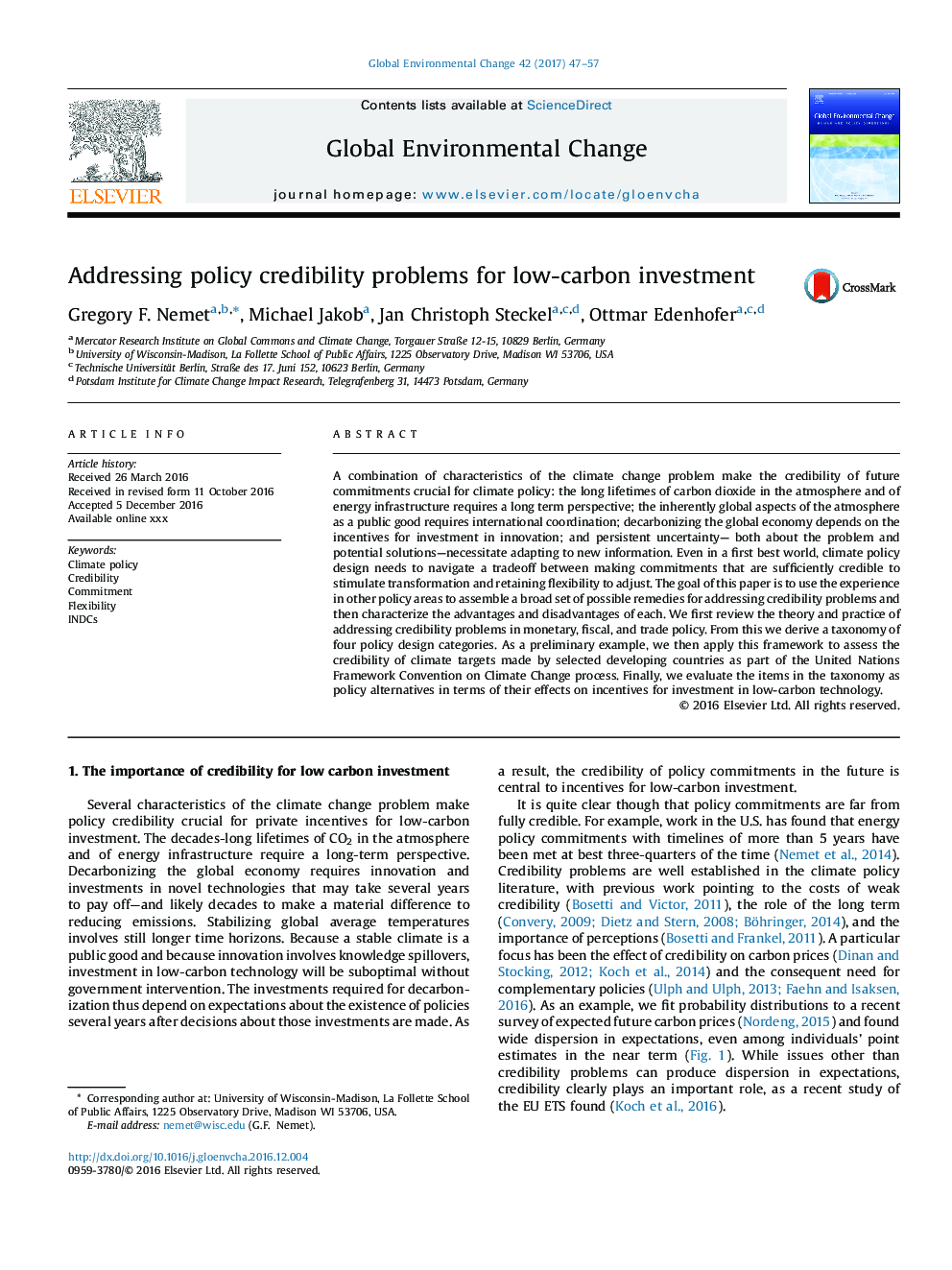| کد مقاله | کد نشریه | سال انتشار | مقاله انگلیسی | نسخه تمام متن |
|---|---|---|---|---|
| 5115977 | 1485116 | 2017 | 11 صفحه PDF | دانلود رایگان |
عنوان انگلیسی مقاله ISI
Addressing policy credibility problems for low-carbon investment
ترجمه فارسی عنوان
رفع مشکلات اعتبار پالیسی برای سرمایه گذاری کم کربن
دانلود مقاله + سفارش ترجمه
دانلود مقاله ISI انگلیسی
رایگان برای ایرانیان
کلمات کلیدی
ترجمه چکیده
ترکیبی از ویژگی های تغییرات اقلیمی اعتبار تعهدات آتی را برای سیاست های آب و هوایی اهمیت می بخشد: طول عمر طولانی دی اکسید کربن در جو و زیرساخت های انرژی نیاز به یک چشم انداز دراز مدت دارد؛ جنبه های ذاتی جهانی جو به عنوان یک خیر عمومی نیاز به هماهنگی بین المللی دارد؛ کربن کردن اقتصاد جهانی به انگیزه های سرمایه گذاری در نوآوری بستگی دارد؛ و عدم اطمینان مداوم - هر دو در مورد مشکل و راه حل های بالقوه - نیاز به سازگاری با اطلاعات جدید. حتی در بهترین جهان اول، طراحی سیاست های آب و هوایی باید بین تجارت تعهداتی که به اندازه کافی معتبر هستند، برای تحریک تحول و حفظ انعطاف پذیری برای تنظیم حرکت کند. هدف این مقاله استفاده از تجربه در زمینه های دیگر سیاست برای جمع آوری مجموعه وسیعی از درمان های احتمالی برای رفع مشکلات اعتبار است و سپس مزایا و معایب هر یک را مشخص می کند. ما ابتدا تئوری و عمل بررسی مشکلات اعتبار در سیاست پولی، مالی و تجاری را بررسی می کنیم. از این طریق، طبقه بندی چهار دسته سیاستگذاری را استخراج می کنیم. به عنوان نمونه اولیه، پس از آن ما سپس این چارچوب را برای ارزیابی اعتبار اهداف اقلیمی که کشورهای انتخاب شده در حال توسعه به عنوان بخشی از کنوانسیون چارچوب سازمان ملل متحد برای تغییرات اقلیمی مورد ارزیابی قرار می دهند، اعمال می کنیم. در نهایت، اقلام را در طبقه بندی به عنوان گزینه های سیاست گذاری از نظر تأثیرات آنها در انگیزه های سرمایه گذاری در تکنولوژی کم کربن ارزیابی می کنیم.
موضوعات مرتبط
علوم زیستی و بیوفناوری
علوم محیط زیست
علوم زیست محیطی (عمومی)
چکیده انگلیسی
A combination of characteristics of the climate change problem make the credibility of future commitments crucial for climate policy: the long lifetimes of carbon dioxide in the atmosphere and of energy infrastructure requires a long term perspective; the inherently global aspects of the atmosphere as a public good requires international coordination; decarbonizing the global economy depends on the incentives for investment in innovation; and persistent uncertainty- both about the problem and potential solutions-necessitate adapting to new information. Even in a first best world, climate policy design needs to navigate a tradeoff between making commitments that are sufficiently credible to stimulate transformation and retaining flexibility to adjust. The goal of this paper is to use the experience in other policy areas to assemble a broad set of possible remedies for addressing credibility problems and then characterize the advantages and disadvantages of each. We first review the theory and practice of addressing credibility problems in monetary, fiscal, and trade policy. From this we derive a taxonomy of four policy design categories. As a preliminary example, we then apply this framework to assess the credibility of climate targets made by selected developing countries as part of the United Nations Framework Convention on Climate Change process. Finally, we evaluate the items in the taxonomy as policy alternatives in terms of their effects on incentives for investment in low-carbon technology.
ناشر
Database: Elsevier - ScienceDirect (ساینس دایرکت)
Journal: Global Environmental Change - Volume 42, January 2017, Pages 47-57
Journal: Global Environmental Change - Volume 42, January 2017, Pages 47-57
نویسندگان
Gregory F. Nemet, Michael Jakob, Jan Christoph Steckel, Ottmar Edenhofer,
